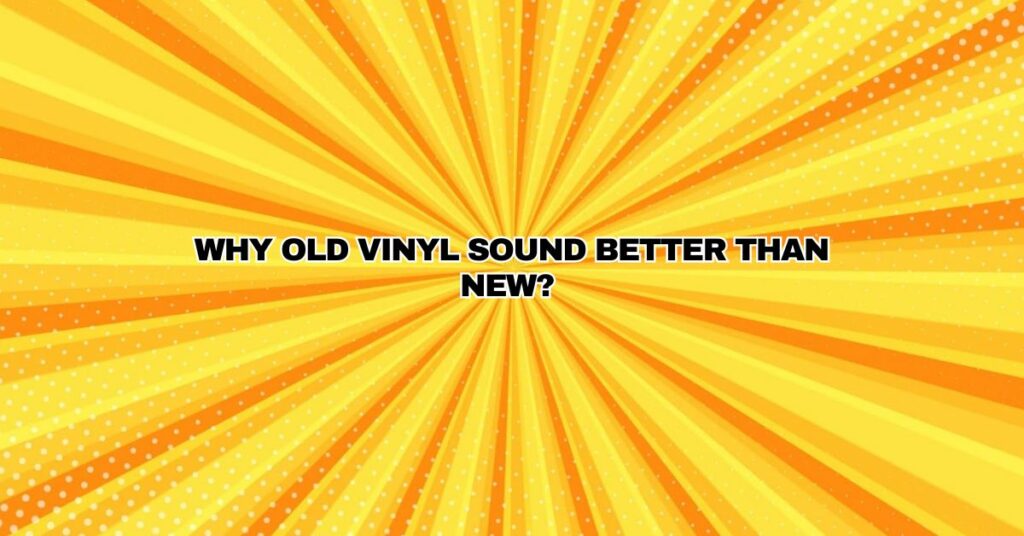Vinyl records have made a remarkable resurgence in recent years, appealing to both audiophiles and music enthusiasts alike. The warm, rich sound of vinyl is often hailed as superior to the digital formats that have become ubiquitous in our modern world. What’s intriguing is that many people firmly believe that old vinyl records, sometimes decades old, sound better than their contemporary counterparts. In this article, we’ll explore the reasons behind this perception and delve into the unique qualities that make vintage vinyl records so captivating to the ears.
The Analog vs. Digital Debate
To understand why old vinyl records are often preferred over new ones, it’s essential to grasp the fundamental differences between analog and digital audio. Vinyl records are analog, which means they store sound as physical, continuous waveforms. In contrast, digital audio (e.g., CDs, MP3s) represents sound through numerical samples taken at discrete intervals. Vinyl’s analog nature allows for a continuous, natural reproduction of sound, while digital audio can sometimes sound clinical and sterile.
- Vinyl’s Unique Warmth
One of the most cherished aspects of vintage vinyl is the warmth it adds to the music. This warmth is due to the inherent imperfections of the analog format. During the production of vinyl records, tiny irregularities and distortions occur in the groove, which results in a distinct, pleasing warmth and depth to the music. These imperfections may include surface noise, crackles, and pops that some find endearing, almost like listening to a live performance.
- The Art of Mastering
Vinyl mastering is an art that requires skill and experience. Mastering engineers work to optimize the sound for vinyl, adjusting the bass, midrange, and treble frequencies, and ensuring that the grooves on the record won’t lead to distortion or skipping. These engineers take great care to make each vinyl release sound exceptional, which is why older records often benefit from meticulous mastering, further enhancing their perceived sound quality.
- Vintage Pressings and Materials
The quality of the materials and the precision in the production process play a significant role in the sound of old vinyl records. Many vintage records were pressed using high-quality vinyl and mastering techniques that are hard to replicate today. Furthermore, the choice of materials, including the vinyl compound and the stylus, has a profound effect on the overall sound quality. Some vintage records were produced with exceptional attention to detail and care, making them cherished items in many audiophiles’ collections.
- Vinyl’s Physical Interaction
Vinyl records require a tangible, physical interaction with the medium. The act of setting the needle down and watching the record spin creates a unique connection between the listener and the music. This tactile engagement adds to the overall listening experience, making the music feel more personal and immersive.
- Vintage Equipment
The nostalgia and authenticity associated with vinyl extend to the playback equipment. Many audiophiles prefer vintage turntables and tube amplifiers to complement their old records. These classic components often have a distinct sound signature that complements vintage vinyl recordings, creating an audio synergy that’s difficult to replicate with modern digital systems.
- A Record’s History
The history of a vinyl record can also influence its appeal. A well-preserved, vintage record that has been carefully handled and cherished by its previous owners may carry a sense of nostalgia and a story that newer records can’t match. Collectors often relish records with interesting histories, such as limited editions, rare pressings, or records owned by famous musicians.
- The Emotional Connection
Music is deeply tied to emotions, and vinyl records provide a unique means of connecting with the music and the artist’s intention. The tangible, analog nature of vinyl can evoke a sense of nostalgia, transporting listeners to a different time and place. The ritual of flipping the record, examining the album cover, and reading liner notes all contribute to a more immersive and emotionally charged listening experience.
Conclusion
In the ongoing debate between vinyl and digital audio, it’s important to recognize that preferences for old vinyl records over new ones often center on the qualities that make analog music unique. The warmth, character, and history associated with vintage vinyl, along with the exceptional care that went into their production, contribute to their enduring appeal. While modern vinyl records still offer a satisfying listening experience, the allure of old vinyl remains strong for those who appreciate the tangible, nostalgic, and emotionally resonant aspects of this timeless medium. Whether it’s the captivating crackles and pops, the history and stories behind each record, or the warm, analog sound that fills a room, old vinyl records have a magic that continues to captivate listeners worldwide.


